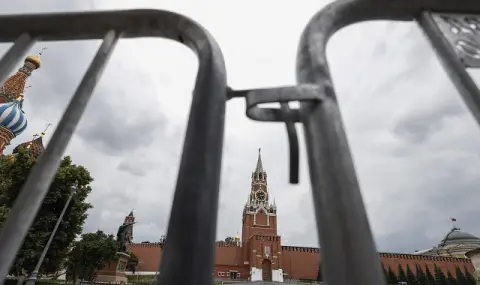Kremlin is spending about 59 billion rubles (about $648 million) to strengthen its technical capabilities to limit Internet traffic on its sovereign Internet. Forbes' Russian service reported on September 9 that it had obtained documents on the Russian federal project "Infrastructure for cyber security" detailing how Roskomnadzor will spend 59 billion rubles between 2025 and 2030 to update its system of "technical means to counter threats" (TSPU), which the Kremlin uses to block certain websites. The $59 billion budget is roughly 86 percent of the 68 billion rubles (about $747 million) the Kremlin is allocating to the broader federal Cyber Security Infrastructure project. This TSPU update will reportedly include upgrading existing systems and installing new systems to account for the increase in user traffic. Forbes noted that modernizing and augmenting the TSPU's systems will increase Roskomnadzor's ability to block virtual private networks (VPNs) that Russians can use to circumvent Roskomnadzor's restrictions on which websites they can view while in Russia.
The head of Roskomnadzor Andrey Lipov previously stated that the service completed the equipment of all TSPU communication nodes in September 2023, and the head of the Center for Special Projects of the Main Radio Frequency Center of Roskomnadzor Sergei Temny said as early as June 2024 d. that Roskomnadzor no longer buys foreign equipment for and is working to replace the existing foreign equipment for the TSPU with domestically produced alternatives.
Roskomnadzor has previously used TSPU to restrict access to X (formerly Twitter), and recently probably did the same to YouTube. Recently, the Kremlin has stepped up its efforts to get Russians to abandon Western sites and social media in favor of Kremlin-approved alternatives. The Kremlin is likely trying to strike a balance between promoting self-censorship as a self-deterrent among Russian ultranationalists and other critics of Russian authorities and imposing actual technical restrictions on access to information and Internet services.
US Secretary of State Anthony Blinken confirmed on September 10 that Iran had sent short-range ballistic missiles (SRBMs) to Russia amid rising international tensions over Tehran's support for Russia's war in Ukraine.
Blinken did not specify the volume of deliveries of ballistic missiles, but warned that Russian forces are likely to use them
The British newspaper The Times, citing Ukrainian intelligence sources, reported that on September 4, Iran delivered over 200 Fateh-360 missiles to Russia. through a port in the Caspian Sea, and ISW continues to estimate that in the coming months Russia will use Iranian-supplied weapons to strike Ukrainian critical infrastructure, thus easing the strain on Russia's domestic missile production capacity.
On September 10, Blinken and British Foreign Secretary David Lammy confirmed that the US and UK were "completely unanimous" regarding the need to address Iranian influence in both Ukraine and the Middle East. France, Germany and the United Kingdom have jointly condemned the supply of Iranian ballistic missiles and stressed that they are taking steps to cancel bilateral air services with Iran, identify individuals and organizations involved in Iran's ballistic missile program and in the transfer of ballistic missiles to Russia. and imposing sanctions on Russian cargo ships.
Russia and the People's Republic of China (PRC) continue to seek different avenues for military-technical cooperation. US Deputy Secretary of State Kurt Campbell told POLITICO that the PRC is giving Russia's defense industry a "very substantial" support in exchange for secret Russian military technology. Campbell stressed that the PRC is not just supplying dual-use products to Russia, but is making "significant efforts to help maintain, build and diversify elements of the Russian military machine". Campbell warned that in return, Russia was sending China protected submarine, aircraft and missile technology that Russia had previously been reluctant to share with Beijing. Chinese officials continue to deny support for Russia's military effort and claim that China remains "impartial" when it comes to Russia's war in Ukraine, despite the West often reporting on China's material support for Russia's military-industrial complex and capabilities to geospatial intelligence.
The announcement of more direct Chinese support for Russia comes amid the Russian-led Ocean 2024 international naval exercises. Russian President Vladimir Putin announced the start of "Ocean-2024" on September 10 and accused the US of putting pressure on Russia and China. It was this pressure that necessitated the holding of joint naval exercises.
US President Joe Biden said the presidential administration is working to lift restrictions on Ukraine's ability to use US-supplied weapons to strike military facilities on Russian territory. In response to a journalist's question, Biden said that his administration is "working on this issue right now".
US Secretary of State Anthony Blinken also confirmed earlier in the day, during a press conference with UK Foreign Secretary David Lammy, that Biden and UK Prime Minister Keir Starmer are likely to discuss lifting those restrictions . Blinken is likely to use the visit to Kiev to inform Ukrainian officials that the United States will allow Ukrainian forces to use US-supplied ATASMS missiles to strike Russian territory.
On the night of September 9-10, Ukrainian forces launched a large series of drone strikes against targets in Russia. The Russian Ministry of Defense (MoD) claims to have intercepted a total of 144 Ukrainian drones, of which 20 were over the Moscow region. Most local authorities reported damage from falling debris, including a blocked section of Kashirskoe Shosse from Domodedovo to Moscow-city, temporary restrictions were put in place at Vnukovo, Domodedovo airports; and "Zhukovsky" near Moscow, as well as at the airport in Kazan, Republic of Tatarstan. The authorities of the Tula region said that debris from drones fell on an unspecified energy site, but without damaging the site. Russian pro-military bloggers criticized regional authorities for claiming that falling "debris" have caused damage to infrastructure during the strikes, and reiterated their calls for Russian authorities to allow the Russian military, Rosgvardiya, border services and private security firms to set up mobile fire groups to cover drone strikes.
